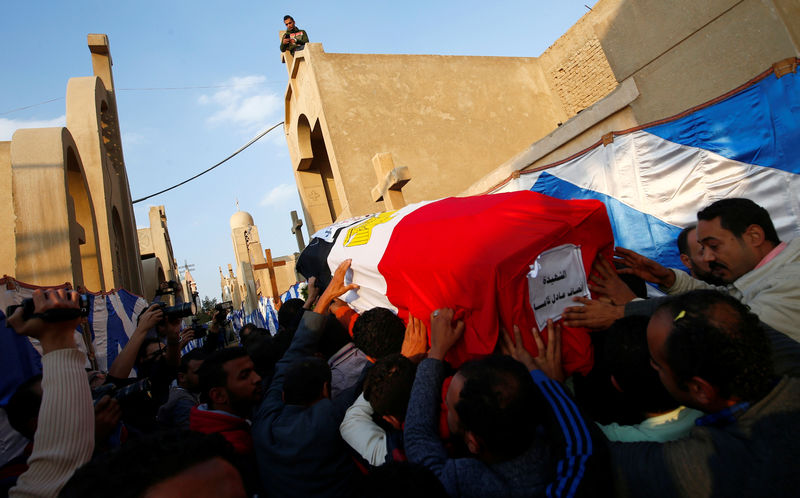By Lin Noueihed and Ahmed Mohammed Hassan
CAIRO (Reuters) - A suicide bomber who killed at least 25 people in Cairo's main cathedral on Sunday was a Muslim Brotherhood supporter who joined a militant cell while on the run from police, the Interior Ministry said.
In an interview with Reuters, the mother of the alleged bomber said he had been sexually abused in police custody in 2014, but she had seen no sign he had been radicalized.
At least 49 people were wounded when the bomb went off in a chapel adjoining St Mark's Cathedral, Cairo's largest church and seat of the Coptic Christian papacy.
The interior ministry named the attacker on Monday as Mahmoud Shafik Mohammed Mostafa, a 22-year-old student. President Abdel Fattah al-Sisi said four people had been detained and two were on the run.
Sisi took power in 2013, deposing Mohamed Mursi of the Muslim Brotherhood, and has since outlawed the Islamist movement as part of a crackdown in which hundreds of its supporters have been killed and thousands jailed.
The Interior Ministry said Mahmoud was arrested in March 2014 for carrying arms during a protest, and was freed on bail after two months. It said he had joined a cell led by Mohab Mostafa Sayyed Qassem, a militant with links to Islamic State fighters in Northern Sinai and exiled Brotherhood officials in Qatar, and was wanted in two other cases.
"MAHMOUD WOULD NOT DO THIS"
Sitting in a two-storey house with her four daughters, his mother, Umm Bilal, said Mahmoud fled to Sudan shortly after being released.
"Mahmoud would not do this... he would not kill anyone," she shouted as she listened to a news report on the bombing.
Mahmoud's father died two years ago, said Umm Bilal, who wore a robe and Islamic face covering, or niqab. The young man called his mother regularly from abroad.
"He said he would not return because security forces would detain him again," Umm Bilal said, adding that the last call came about a week ago.
"He was asking after me and his sisters... I didn't notice any change in his voice or anything to suggest he would blow himself up."
Umm Bilal said her son was not radicalized, but had returned broken from police custody. Mahmoud had confided in his brother, she said, that he was sexually assaulted.
"He kept crying all night... He wasn't crying because he was beaten or tortured, though the scars were still visible on his face and body," she said. "I believe they broke him at the station, they violated his honor."
She said his two brothers had also been arrested, one of them after the bombing.
SPLINTERED MOVEMENT
The Muslim Brotherhood won Egypt's first free elections after the 2011 uprising that ended Hosni Mubarak's 30-year rule.
Mursi became president but was toppled two years later after mass protests.
Egypt's oldest Islamist organization says it is peaceful, but has split into rival wings since the crackdown, while some erstwhile supporters have formed splinter groups that carry out targeted attacks on police and judicial officials.
Disillusioned by its ill-fated flirtation with democracy, some younger Brotherhood supporters have gone to fight in Syria or joined the local arm of Islamic State, which since 2013 has killed hundreds of soldiers and police in Egypt's Sinai peninsula. The army has responded by conducting air strikes and bulldozing entire villages.
No group has claimed responsibility for Sunday's bombing, but Islamic State supporters celebrated online. The group has urged its supporters to launch attacks around the world as it goes on the defensive in its Iraqi and Syrian strongholds.
CCTV footage surfaced overnight showing a man walking briskly out of the church and another walking in seconds before the blast. Reuters could not verify the authenticity of the footage.

(Click here to view the map locating site of bombing in Cairo: http://fingfx.thomsonreuters.com/gfx/rngs/EGYPT-SECURITY-BLAST/010030ZH24S/EGYPT-SECURITY-BLAST-01.jpg)
